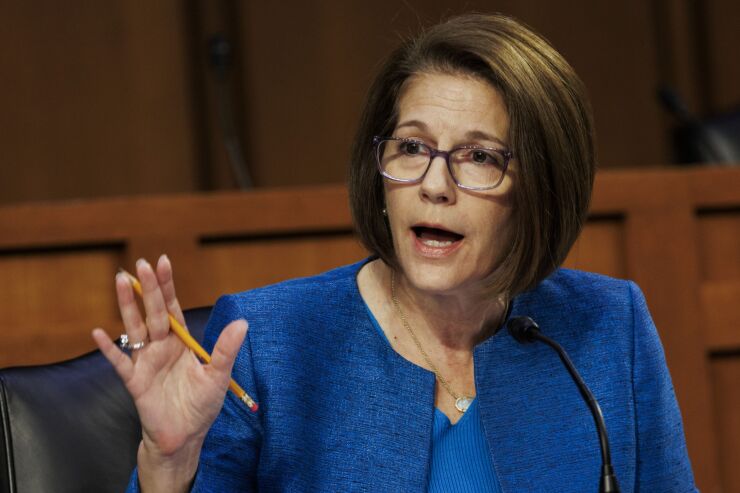A new bill in Congress would target a problem that experts say is costing small retail investors and wealth managers alike in FINRA arbitration cases.
The Investor Justice Act —
Cortez Masto's bill would allot $5 million of SEC money to the program, which a 2018 estimate would suggest is
"It allows people to get away with an enormous amount of conduct, so long as they spread it out," said Benjamin Edwards, the director of the Public Policy Clinic at the University of Nevada, Las Vegas William S. Boyd School of Law. "If you swindle one person for $1.5 million, you're going to face justice. If you rip off hundreds of people for just thousands of dollars, you're probably going to get away with it, unless people take it on pro bono or unless someone walks into a free law clinic."
UNLV's clinic assists nonprofits with regulatory policy matters, but Edwards hears often from investors who have potential cases but nowhere to turn. He and other legal experts say there's a representation gap among clients seeking damages below $100,000 after suffering losses at the hands of financial advisors and wealth managers. Fewer than half those claims have attorneys representing the harmed client, compared to a 75%-80% rate among larger cases, according to Drexel University assistant professor of law Nicole Iannarone, who's currently researching FINRA arbitration cases filed by those so-called smaller investors.
The fact that "we have so many smaller, unrepresented claims" raises "concerns that I think the Investor Justice Act can help fix," Iannarone said. "If there are resources that are free for students who are supervised by experienced attorneys, that helps both investors and, frankly, the industry as well by reducing their cost of defending against meritless claims."
However, it remains to be seen whether the industry will line up behind a bill designed to, in Cortez Masto's
Representatives for the independent wealth manager advocacy group the Financial Services Institute declined to discuss the legislation, while the brokerages, banks and asset managers represented by the Securities Industry and Financial Markets Association didn't respond to an email asking for the group's stance. So far, no Republicans are co-sponsoring either bill.
Litigation-wary advisors and firms stand to gain from the legislation, because the legal assistance "can be very useful or good for brokerage firms as well," Edwards said.
"If they can get good advice from someone independent, they might not file. They'll accept from an investors clinic that represents investors that they don't have a claim," he said. "When they are flailing their way through the system, they can be a lot more difficult to deal with as a counterparty in arbitration or litigation than having appropriate counsel on the other side."
For the investors, many of them technically have lost too little to be able to find an attorney to argue the case while having too much income to qualify for other programs, Lazaro said.
"Most other clinical programs, to the extent they're providing representation to high-need individuals, there are grant sources available," she said. "Most of our clients wouldn't qualify for Legal Aid representation."
Then-SEC Chairman Arthur Levitt launched a pilot program in 1997 to start clinics at two schools and the FINRA Foundation released grants of $250,000 apiece to eight clinics between 2009 and 2012. A 2014 academic study later
"There's a lot of need outside New York," Iannarone said. "This is a nice solution to address that, and I really hope that Congress sees that on both sides of the aisle."








